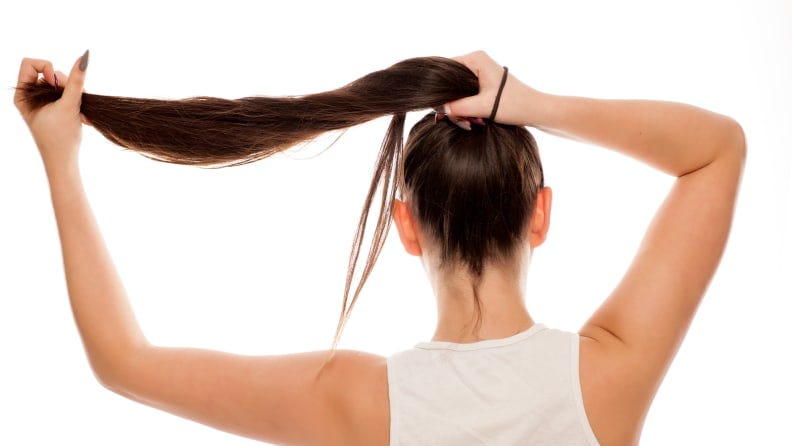[ad_1]

The U.S. Army will loosen restrictions on lipstick, nail polish and protective hairstyles in an effort to promote gender and racial inclusion.
The U.S. Army this week unveiled an updated grooming policy that is set to go into effect in late February. The new policy also removes hair length and dimension requirements and allows ponytails and earrings.Â
The revisions were decided by a 17-soldier panel, including 15 women, who assessed grooming suggestions focused on health, wellness, diversity and inclusion of soldiers while keeping “professional appearance” in mind, the Army said.Â
“I see (the new standards as) being a little bit more aware of the different hair textures and hair types that our soldiers have,” said Deshauna Barber, CEO of Service Women’s Action Network, an advocacy group for military women. Barber is African American and described her hair as “one of the biggest struggles” while in the military for 10 years.
“We’re looking at, you know, a future of women that will have healthier hair,” Barber, an Army Reserve captain, said. “It’s important for us to feel like we can walk into the military … and feel confident in the way that we look and we’re not sacrificing our appearance or our hair health.”Â
More:National defense bill pushes Pentagon to buy body armor for women in the military
Under the current policy, female soldiers’ hair cannot be shorter than one-forth of an inch or have braids, twists, locks or cornrows that are wider than half an inch. The new policy removes these restrictions.Â
Previously, only buns were permitted for female soldiers with medium-length hair. The new standard will now allow them to tie their hair in a ponytail “if the individual’s hair length or texture prevents them from securing it into a tight bun,” the press release . says.
Soon, all soldiers will also be able to dye their hair any natural color, and female soldiers can wear lipstick and nail polish in approved colors. Bold colors such as purple, blue, pink, green, orange, bright red and neon colors are still not permitted. Men also will be allowed to wear clear nail polish.
Earrings will also be allowed for female soldiers when not in the field or in combat. They must be screw-on, clip-on or post-type; be gold, silver or diamond; and meet diameter requirements.Â
Mady Segal, a military sociologist and professor emerita at University of Maryland, College Park, said it’s an “excellent step forward,” but worries that many of these guidelines are specific to women and not inclusive to male soldiers.Â
“Anytime there’s a difference in regulations by gender, or sex, there is a tendency for the men to feel like they are not being treated equally,” Segal said.Â
She cited the guideline that allows colored nail polish for female soldiers but only clear nail polish for male soldiers, saying that follows social norms.Â
“We’re moving in our country and our society, and, frankly, in a lot of nations, toward not making distinctions based on gender,” Segal said. “So I’m wondering if this is going to be enough. Maybe it’ll be incremental.”Â
The new standards will also remove “potentially offensive and weaponized words and phrases” such as “Mohawk, Fu Manchu, dreadlock, eccentric, and faddish,” the Army said in a statement.Â
In announcing the changes, the Army said they’re part of its “commitment to improve the wellbeing of all soldiers.”
“This is one of the many facets of putting our people first and recognizing who they are as human beings,” said Sgt. Maj. Brian Sanders, senior enlisted leader of Army G-1’s uniform policy branch, in a statement. “Their identity and diverse backgrounds are what makes the Army an ultimate fighting force.”
Senior leaders recently approved the changes recommended by the panel of soldiers of different races and cultural backgrounds, and from different ranks and career fields, the Army said. The process included dermatologists, a psychologist and an equal opportunity adviser.Â
Hairstyle laws:Banning ethnic hairstyles ‘upholds this notion of white supremacy.’Â
In recent years, states and cities have passed legislation to prohibit discrimination based on hairstyles, which disproportionately affects Black women.Â
The Creating a Respectful and Open World for Natural Hair (CROWN) Act was first adopted in California in 2019, and it was followed by New York, New Jersey, Maryland, Colorado, Virginia and Washington.Â
“This is not just about hair, it’s about acknowledgement of personal rights, it’s about checking bias,” California State Sen. Holly Mitchell previously told USA TODAY.
“Our hair has always been a source of either pride or embarrassment, a sense of power or a sense of unequalness,†she said.Â
The CROWN Act was passed by the U.S. House of Representatives in September but approval from the Senate and President Donald Trump was stalled.Â
The legislation may be revived as the Democrats now control the Senate and President Joe Biden has focused on combating racial inequalities in his first week with new executive orders.Â
Joe Biden pledges to address pay, systemic racism: ‘Black and Latino unemployment gap remains too large’
Contributing: Associated Press;Â Nicquel Terry Ellis and Charisse Jones, USA TODAY.
[ad_2]
Source link






